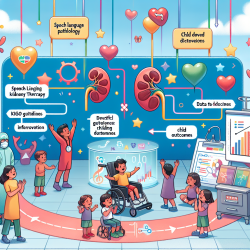Unveiling the Power of Kidney Donor Guidelines in Pediatric Speech Therapy
In the realm of pediatric speech therapy, creating optimal outcomes for children is paramount. The recent KDIGO Clinical Practice Guideline on the Evaluation and Care of Living Kidney Donors provides a wealth of data-driven insights that can be leveraged to enhance therapeutic practices and decision-making processes. By integrating these guidelines, practitioners can refine their approach, ensuring that therapy is not only effective but also grounded in the latest evidence-based research.
Why Kidney Donor Guidelines Matter
The KDIGO guidelines emphasize a comprehensive approach to evaluating potential kidney donors, focusing on risk assessment and shared decision-making. These principles are equally applicable in pediatric speech therapy, where understanding the individual profiles of children, including their health and demographic characteristics, can significantly influence therapy outcomes.
Implementing Data-Driven Decisions
Data-driven decision-making is a cornerstone of both the KDIGO guidelines and effective speech therapy. By utilizing a quantitative framework to assess risks and benefits, practitioners can tailor their therapeutic interventions to the specific needs of each child. This approach not only enhances the precision of therapy but also ensures that interventions are based on solid evidence.
Encouraging Further Research
The KDIGO guidelines highlight the importance of ongoing research to refine risk prediction models and improve outcomes. In pediatric speech therapy, similar emphasis on research can lead to the development of innovative techniques and interventions. Practitioners are encouraged to engage in research initiatives, contributing to a growing body of knowledge that benefits children globally.
Conclusion
Integrating the principles of the KDIGO Clinical Practice Guideline on the Evaluation and Care of Living Kidney Donors into pediatric speech therapy can transform the way practitioners approach therapy. By focusing on data-driven decisions and ongoing research, therapists can ensure that their practices are not only effective but also aligned with the latest evidence-based standards. For those interested in delving deeper into the KDIGO guidelines, the original research paper can be accessed here.










